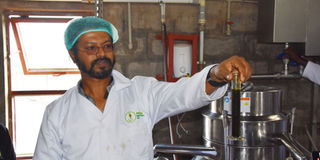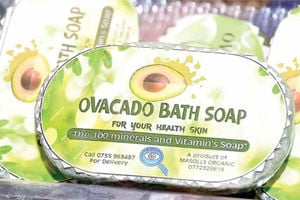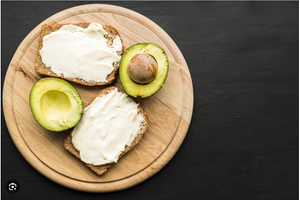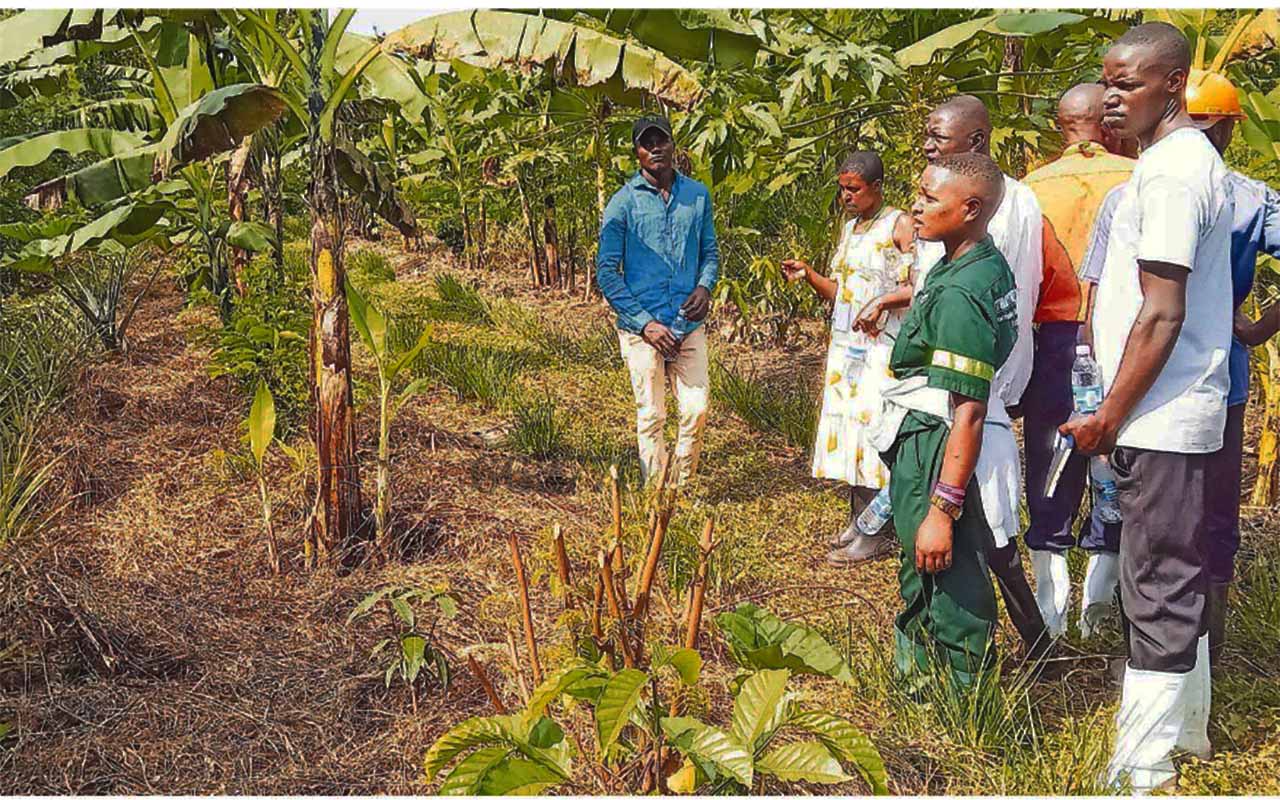
Mohammed Hanif of Musubi Farms displays extracted oil from Hass avocado at their facility in Najjembe. PHOTO/George Katongole
Once primarily a source of nutritious pulp, the avocado is emerging as Uganda’s next big export commodity. According to the National Agricultural Advisory Services (Naads), Hass Avocado has a high global demand and was valued at $12.8b in 2019 and is expected to rise to $17.9b by 2025.
The fruit’s oil, rich in monounsaturated fats and antioxidants, is capturing global attention, positioning the country as a potential leader in the lucrative avocado oil market. While Uganda has long been an avocado-growing nation, the focus has traditionally been on fruit consumption. However, with increasing awareness of the health benefits of avocado oil, the industry is undergoing a transformation.
“Avocado oil is a goldmine waiting to be fully exploited. The demand for our product is growing rapidly, both locally and internationally,” says Mohammed Hanif, the operations manager of Musubi Farm oil processing plant in Najjembe, Buikwe District.
Musubi Farms is among the five companies exporting ovacado oil to Europe and Gulf countries. The others are Avolio in Namanve, Biosyntech in Kasese, Balaji in Nakaseke and Njojo in Kyenjojo.
All the five factories process 63,000 tonnes of fresh avocado every year which translates into 2.5 million kilogrammes of crude avocado oil which fetches about $11.5m in foreign exchange every year.
Hass avocados are the preferred choice for oil extraction primarily due to their high oil content. The oil content in Hass avocados typically ranges from 16-24 percent of the fruit’s weight.
Taking root
Despite the promising outlook, challenges persist. Many processors operate below capacity due to insufficient avocado supply, particularly the Hass variety. Processors argue that increased cultivation of Hass avocados is crucial for the industry’s growth.
Hanif says that their state-of-the-art extraction factory in Najjembe is processing below capacity, extracting two tonnes per day and less than 600 litres of oil from local varieties. At the export market, Musubi sells a litre of crude oil at $5 (about Shs18,000).
Typically, processors need anywhere between 4 to 6.67 kilogrammes of avocados to produce one kilogramme of avocado oil. “At full capacity, we’re able to process 24 tonnes per day. But we don’t have enough supply of the Hass avocado.
Musubi uses Hass avocado harvests from their 2,000 acre farm in Mayuge District to extract the highly-valued extra virgin oil. Extra virgin avocado oil is a higher quality product with a better flavour profile compared to crude avocado oil. While both contain beneficial nutrients, extra virgin avocado oil is more versatile and suitable for culinary applications.
“A lot of care has to be taken at the farm level to get extra virgin avocado oil quality. Key factors include: cultivar selection, proper fertilisation, pest control, irrigation, harvesting and post-harvest handling. These elements collectively influence oil yield, flavour, and nutrient content,” Hanif explains.
While farmers are paid between Shs300 and Shs350 per kilogramme of local varieties, a kilogramme of Hass avocado attracts Shs800. Typically, a dry matter content of 21-23 percent is considered ideal for most avocado varieties.
Seizing the opportunity
Uganda is embarking on a new chapter with a focus on Hass avocado production. Inspired by the success of neighbouring Kenya, the world’s sixth-largest avocado producer with an output of 322,000 tonnes in 2020, Uganda aims to carve its own niche in the global avocado market.
Historically, Uganda’s avocado production centred on local, green-skinned varieties primarily catering to domestic and Middle Eastern markets. Renowned for its extended shelf life, rapid tree maturation, and substantial yields, Hass offers Uganda a promising avenue to penetrate lucrative export markets, particularly in Europe.
While commercial Hass avocado cultivation commenced only in early 2023, the industry is brimming with optimism about Uganda’s potential to become a significant player in the global avocado trade.
Macadamia and Hass Avocado are top of Uganda’s emerging non-traditional cash crops with economic potential to increase the country’s foreign exchange earnings and improve household incomes.
Through Naads, the government is promoting and scaling up the production of these emerging high-value commodities working with both small scale and large scale farmers to promote massive production which can meet local and international market demands.
Naads has partnered with eight large scale producers of the two crops to enable access to quality planting materials to the smallholder farmers. To-date, 623,870 seedlings of Hass avocado have been distributed to established 3,125 acres in 80 districts. Dr Samuel Mugasi, the Executive Director of Naads notes that all beneficiary farmers pay 30 percent contribution.
Under this arrangement, the smallholder farmers access extension services, storage, processing and value addition as well as market information and financial support from the big producers.
Khadija Blessing Nakakande, the head of communications and public relations – Naads Secretariat
“These crops are fairly new to most Ugandan farmers, this means there is limited knowledge on the best agronomic practices to be followed and a lot of questions on their profitability and market opportunities. There are webs of interactions with other farmers and notable professionals that will make farming successful,” Nakakande said. During a strategic intervention for promotion of Hass Avocado and Macadamia held at Musubi Farms in Mayuge, Nakakande noted that the Naads secretariat supports the entire commodity value chain of agribusiness and value chain development and other government strategic interventions regularly.
While these initiatives offer hope for the Hass avocado industry in Uganda, several challenges persist. More research and extension services are crucial to enhancing farming practices and boosting yields. For instance, Juliet Katali, a farmer from Namasiga village in Jinja District, encountered low success rates despite planting 100 avocado seedlings in 2023. This highlights the need for improved support to farmers.
With proper investment and strategic planning, avocado oil could become a major foreign exchange earner for Uganda, creating jobs and boosting rural economies. As the world increasingly seeks natural and healthy products, the country’s green gold is poised to shine.
Cost
A Hass avocado seedling costs between Shs7,500 and Shs8,500 while a macadamia seedling costs between Shs10,000 and Shs11,000.








